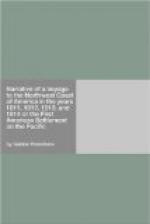We began to feel sensibly the want of water: since passing the tropic of Capricorn the daily allowance had been always diminishing, till we were reduced to three gills a day, a slender modicum considering that we had only salt provisions. We had indeed a still, which we used to render the sea-water drinkable; but we distilled merely what sufficed for the daily use of the kitchen, as to do more would have required a great quantity of wood or coal. As we were not more than one hundred and fifty leagues from the Falkland isles, we determined to put in there and endeavor to replenish our casks, and the captain caused the anchors to be got ready.
We had contrary winds from the 27th of November to the 3d December. On the evening of that day, we heard one of the officers, who was at the mast head, cry “Land! Land!” Nevertheless, the night coming on, and the barren rocks which we had before us being little elevated above the ocean, we hove to.
CHAPTER III.
Arrival at the Falkland Isles.—Landing.—Perilous Situation of the Author and some of his Companions.—Portrait of Captain Thorn.—Cape Horn.—Navigation to the Sandwich Islands.
On the 4th (Dec.) in the morning, I was not the last to mount on deck, to feast my eyes with the sight of land; for it is only those who have been three or four months at sea, who know how to appreciate the pleasure which one then feels even at sight of such barren and bristling rocks as form the Falkland Isles. We drew near these rocks very soon, and entered between two of the islands, where we anchored on a good ground. The first mate being sent ashore to look for water, several of our gentlemen accompanied him. They returned in the evening with the disappointing intelligence that they had not been able to find fresh water. They brought us, to compensate for this, a number of wild geese and two seals.
The weather appearing to threaten, we weighed anchor and put out to sea. The night was tempestuous, and in the morning of the 5th we had lost sight of the first islands. The wind blowing off land, it was necessary to beat up all that day; in the evening we found ourselves sufficiently near the shore, and hove to for the night. The 6th brought us a clear sky, and with a fresh breeze we succeeded in gaining a good anchorage, which we took to be Port Egmont, and where we found good water.
On the 7th, we sent ashore the water casks, as well as the cooper to superintend filling them, and the blacksmiths who were occupied in some repairs required by the ship. For our part, having erected a tent near the springs, we passed the time while they were taking in water, in coursing over the isles: we had a boat for our accommodation, and killed every day a great many wild geese and ducks. These birds differ in plumage from those which are seen in Canada. We also killed a great many seals. These animals




